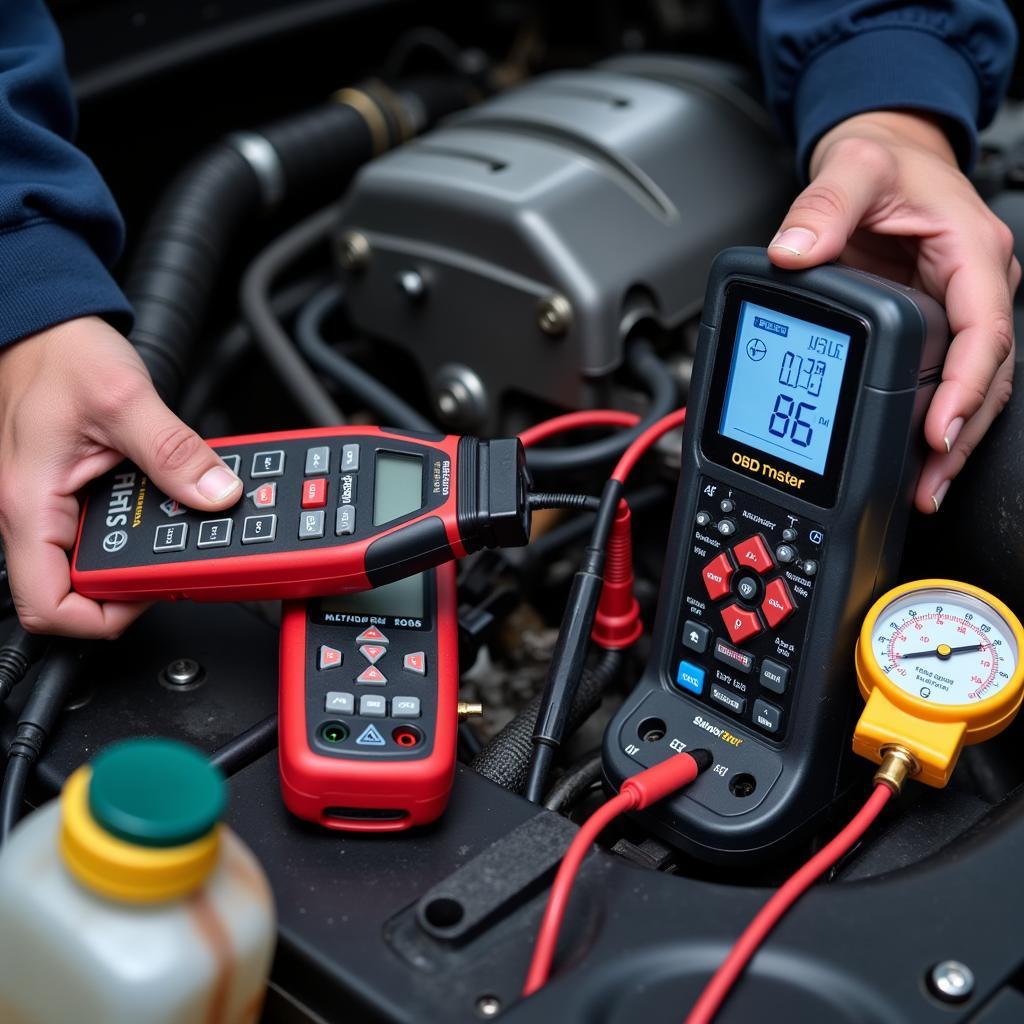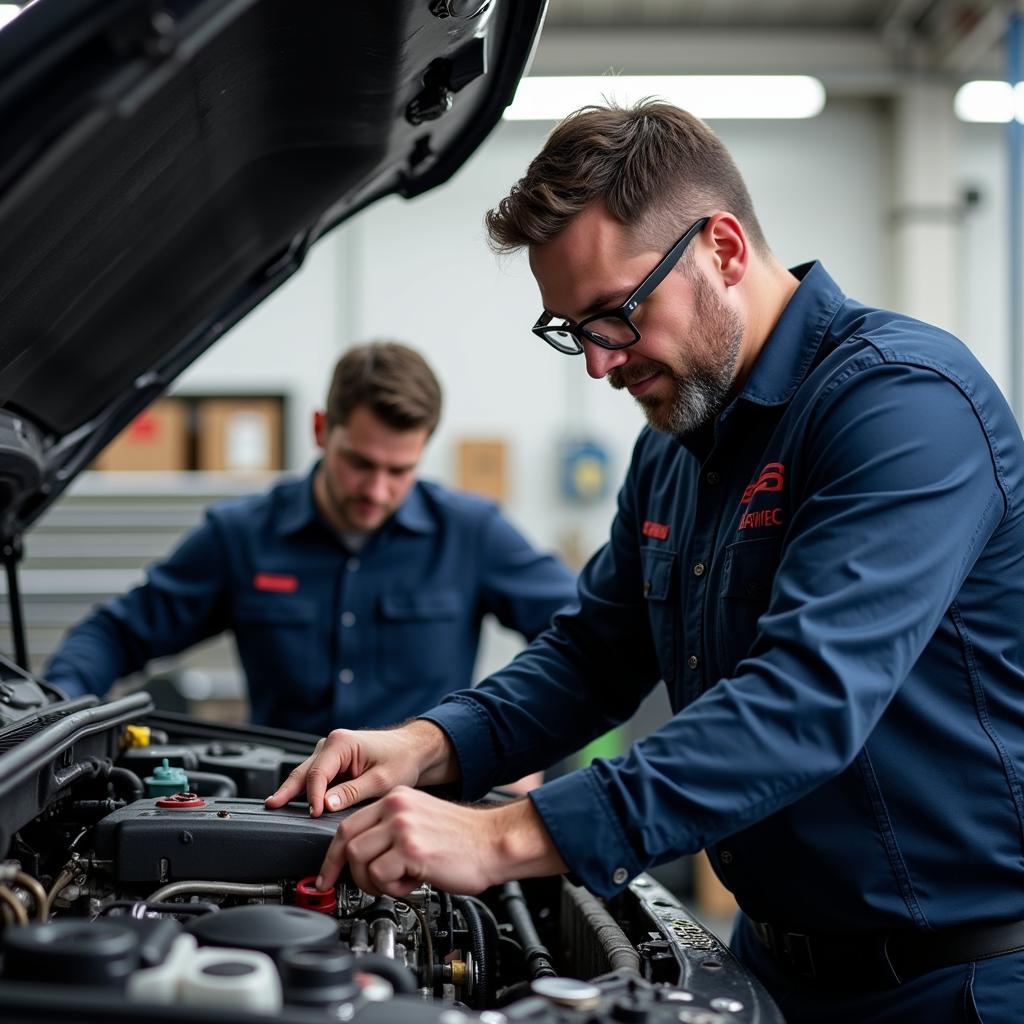Fixing a car engine can seem daunting, but with the right knowledge and approach, it can be a manageable task. This guide provides a comprehensive overview of common car engine problems, troubleshooting steps, and repair options, empowering you to take control of your vehicle’s health. Whether you’re a DIY enthusiast or seeking professional help, understanding the basics of Fixing Car Engines is essential for every car owner.
After checking the basics, such as battery and spark plugs, you’ll want to move onto more complex diagnostics. Remember safety first! Always disconnect the battery before working on any electrical components of your engine. For a deeper look into car engine repair costs, visit cost of fixing car engine.
Identifying Common Car Engine Problems
Engine problems manifest in various ways, from strange noises and decreased performance to warning lights on your dashboard. Recognizing these signs early on can prevent further damage and save you money in the long run. Some common issues include:
- Unusual Noises: Knocking, ticking, hissing, or grinding sounds can indicate problems with various engine components, such as worn bearings, faulty valves, or a failing timing belt.
- Decreased Performance: Loss of power, sluggish acceleration, or poor fuel economy can be caused by issues like clogged fuel injectors, a malfunctioning oxygen sensor, or a failing catalytic converter.
- Warning Lights: Check engine light, oil pressure light, or temperature warning lights are crucial indicators of potential engine problems. Ignoring these warnings can lead to severe engine damage.
- Starting Problems: Difficulty starting the engine can be due to a faulty starter motor, a weak battery, or problems with the ignition system.
- Excessive Smoke: Blue, white, or black smoke from the exhaust can indicate problems with oil consumption, coolant leaks, or fuel combustion.
 Car Engine Diagnostic Tools
Car Engine Diagnostic Tools
Troubleshooting Your Car Engine
Before rushing to a mechanic, you can perform some basic troubleshooting steps to identify the potential cause of the problem. This can save you time and money.
- Check the Basics: Ensure the battery is properly connected and charged, check the spark plugs, and inspect all fluids, including oil, coolant, and brake fluid. Simple fixes like adding oil or tightening a loose connection can resolve many issues.
- Use an OBD-II Scanner: This device connects to your car’s computer and retrieves diagnostic trouble codes (DTCs). These codes provide valuable clues about the nature of the problem.
- Visual Inspection: Carefully examine the engine compartment for any visible signs of damage, leaks, or loose connections.
- Listen for Unusual Noises: Pay attention to any unusual noises coming from the engine and try to pinpoint their location. This can help narrow down the potential cause.
You can learn more about the general process of car engine repair at fixing a car engine. Even seemingly small problems, like a car seat rattle, can be addressed with some know-how. See graco car seat rattle fix for tips.
Repairing Your Car Engine
Depending on the severity of the problem, you may be able to perform the repairs yourself or you may need to seek professional help. For minor issues like replacing spark plugs or air filters, DIY repairs are often feasible. However, for more complex problems like engine rebuilds or transmission repairs, it’s best to consult a qualified mechanic.
When to Seek Professional Help
While some engine problems can be addressed with DIY solutions, certain situations necessitate professional intervention. These include:
- Complex Engine Problems: Issues involving internal engine components, such as the crankshaft, pistons, or valves, require specialized tools and expertise.
- Transmission Problems: Transmission repairs are notoriously complex and are best left to experienced mechanics.
- Electrical System Malfunctions: Diagnosing and repairing electrical system issues can be challenging and may require specialized equipment.
Thinking about changing your career to car repair? Check out fixing career at 30.
 Professional Mechanic Repairing Engine
Professional Mechanic Repairing Engine
“Regular maintenance is the key to preventing major engine problems. Simple tasks like oil changes, filter replacements, and fluid checks can significantly extend the life of your engine.” – John Smith, Automotive Engineer
“Ignoring warning lights or unusual noises can lead to costly repairs down the line. Addressing engine problems promptly can save you time and money in the long run.” – Jane Doe, Certified Mechanic
Conclusion
Fixing a car engine requires careful diagnosis, troubleshooting, and appropriate repair strategies. By understanding the basics of engine operation, recognizing common problems, and following the troubleshooting steps outlined in this guide, you can take proactive steps to maintain your vehicle’s health. For complex issues, seeking professional help is crucial. Remember, addressing problems early on is key to avoiding costly repairs and ensuring the longevity of your car engine. For more information, please contact us at AutoTipPro. Our phone number is +1 (641) 206-8880, and our office is located at 500 N St Mary’s St, San Antonio, TX 78205, United States.
Even a seemingly simple task like a dirty boy fixing car engine can teach valuable lessons about mechanics. See more at dirty boy fixing car engine.
FAQ
- What are the most common causes of engine misfires? Common causes include faulty spark plugs, ignition coils, fuel injectors, or a vacuum leak.
- How often should I change my engine oil? Consult your owner’s manual for the recommended oil change interval, typically every 5,000-7,500 miles.
- What does the check engine light indicate? It signifies a problem with the engine’s electronic control system. Use an OBD-II scanner to retrieve the diagnostic trouble codes.
- How can I improve my car’s fuel economy? Ensure proper tire pressure, avoid aggressive driving, and address any engine performance issues promptly.
- What are the signs of a failing water pump? Overheating engine, coolant leaks, and a whining noise from the water pump are common indicators.
- What should I do if my car overheats? Pull over immediately, turn off the engine, and let it cool down. Check the coolant level and contact a mechanic.
- How can I prevent engine problems? Regular maintenance, including oil changes, filter replacements, and fluid checks, is essential for preventing major engine issues.




Leave a Reply